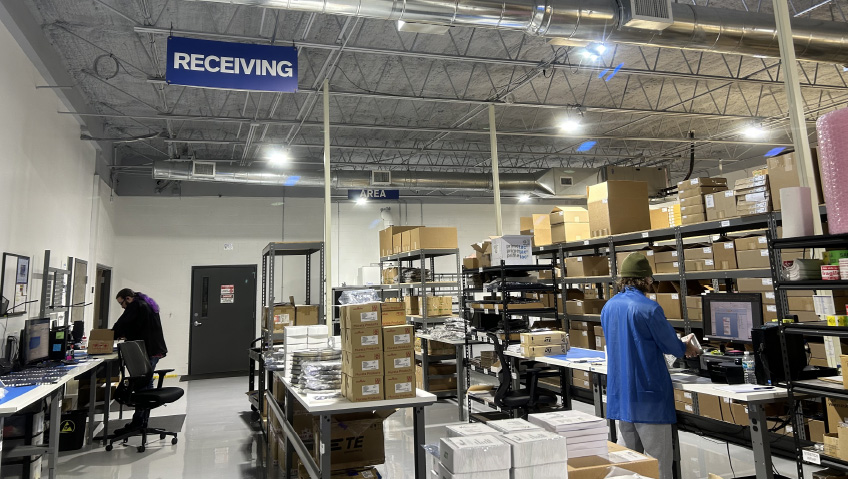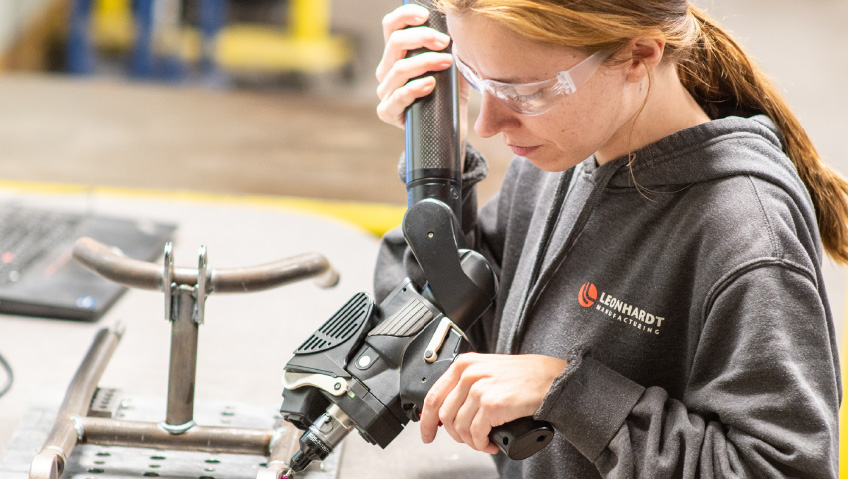Diversified Chemical Technologies, Inc. (DCTI) has passed the half-century mark as a highly-successful African-American-owned business in Detroit, Michigan. With multiple divisions, the growing company specializes in cleaning products, chemicals, adhesives, and sourcing solutions for both MRO and office supplies, and continues to move into new markets.
“We don’t promote ourselves as being a Black-owned business. We promote ourselves as a quality manufacturer of adhesives and chemicals,” notes President and Chief Financial Officer Karl Johnson.
Launched in 1971 by George Hill, who currently serves as Chair and Chief Executive Officer, DCTI’s divisions include Adhesive Systems, Inc. (ASI) which formulates and manufactures packaging adhesives used to seal cereal boxes and other consumer goods. A division called Paperworks, Inc. (PWI) does office supply and maintenance, repair, and operations sourcing while Diversified Chemical Technologies Operating, Inc. (DCTO) oversees chemical formulation development and manufacturing. Among DCTO’s proprietary products are metal-working process fluids, disinfectants, and industrial cleaning solutions for sanitizing factory components and equipment, as well as floors, drains, walls, glass and the like.
“Everything that we make, we developed in-house. We have three product development labs, staffed by five PhDs and a handful of technicians. One lab for adhesives, one for oil-based chemicals, and one for water-based chemicals,” explains Johnson.
DCTI also has a sales operation in Mexico and recently launched a joint venture with a firm called Staffing Synergies. The latter company provides workers and human resource services to warehouses, distribution centers, and light industrial facilities. The venture, called Diversified Synergies, LLC, is doing “what’s called kitting—light assembly, sequencing, small packaging operations. Right now, we’re assembling COVID test kits for a healthcare partner,” Johnson says.
In addition to setting up this partnership, DCTI has been laying the groundwork for a 140,000-square-foot manufacturing plant that is set to open in Chicago in 2024. The facility will initially employ roughly thirty people to make consumer products for an automotive aftermarket client.
The company’s dizzying pace of growth is even more impressive given its humble roots and roundabout origin. Decades ago, Hill was an executive with Chrysler Corporation when he went to a small business administration convention in place of a Chrysler official who could not attend. While waiting to get credentials at the event, he signed up for a seminar for small companies that wanted to get government work in the chemicals sector.
Next thing he knew, he was being offered the chance to enter this marketplace himself. Hill and a former business partner began manufacturing specialty chemicals and launched DCTI together. At first, the company was based in Hill’s Detroit home and had minimal resources and staff.
Getting a start-up business off the ground is always difficult. Being an African-American-led company in a more openly biased or prejudiced era than today presented additional challenges in terms of gaining markets and financial support. “It was a different world in many respects,” recalls Hill, who notes that the riots that ravaged Detroit took place only a few years before the company’s founding.
The early days were far from glamorous. Hill and his former partner pitched local businesses on homemade floor and toilet cleaners they mixed themselves in a 12,000-square-foot plant. Difficult as things might have been at first, Hill never lost faith.
“This is the United States of America, and there’s no substitute for hard work and confidence in yourself,” he asserts.
Hill and his former partner gathered a talented team of chemists and other staff. Innovation and risk-taking became bywords at the fledgling firm, which expanded from janitorial cleaning products to “process-driven products” such as cutting fluids, lubricants, and coolants for automotive manufacturing says Hill.
Over the years, DCTI developed a few products that were “fairly innovative and, in some cases, revolutionary,” including the automotive industry’s first ambient temperature parts washing compound, he continues.
The company was soon recognized for its abilities. In 1978, it was selected as Michigan’s small business supplier of the year “Not the black business, but the small business supplier of the year for the state of Michigan,” says Hill, with a touch of pride. He got to travel to Washington, DC, where he met then-President Jimmy Carter at an event to honor companies that had won the same honor in each state.
Today, Hill is the sole proprietor of DCTI, which employs approximately ninety-four people. Another two hundred work at the Diversified Synergies joint venture.
As befitting the company name, staff members come from a wide variety of backgrounds. There are some common characteristics, however; the firm likes new hires who are talented, hardworking, and self-motivated. The firm offers a tuition refund program for staff members who want to obtain a degree at a post-secondary institution.
DCTI is also a “second-chance employer,” adds Johnson. The company is willing to hire people with criminal records for non-violent offences and “give them the skills that they need to be successful within the organization,” he states.
“Our second-chance related team members have been absolutely splendid,” adds Hill.
The company has created a culture that empowers all workers to embrace the company’s core values. “Number one: do the right thing. Number two: treat others with respect. Number three: be reliable. Number four: be a collaborative team player. Number five: be a problem solver,” lists Johnson.
Interestingly, for a firm that specializes in adhesives and chemicals, DCTI is a strong proponent of sustainability. Hill personally supports sustainability, and many big corporations have started to embrace ecologically friendly products and processes.
Future generations “are not going to inherit the goodies we did in terms of water and air and a whole host of things,” unless measures are taken to avert man-made climate change, says Hill, adding, “I do not think, overall on a global basis, that we have taken all the steps we need to take to preserve [the environment].”
As for the business side of sustainability, he says, “We’re an awfully small company to have so many Fortune 500 companies as customers, and sustainability and being green is one of their objectives… We are going to help them meet whatever their strategic objectives are.”
The company practices what it preaches. It is currently “helping to develop a plant-based labeling adhesive,” that boasts a significantly smaller carbon footprint than chemical-based or petroleum-based products, says Johnson. He will not reveal much more, citing corporate privacy issues, but says this eco-friendly labeling adhesive might be ready for release in 2023. The company has a long-term sustainability initiative and to date has reduced both waste-to-landfill and water consumption by over 20 percent, and continues to make improvements. The company also treats waste-water used in its manufacturing operations on-site before discharge into the City sewer system.
DCTI is certified as a Michigan Minority Business Enterprise (MBE) and has a passion for “creating prosperity in communities of color,” says Johnson. This entails hiring people from areas where the firm has a presence and participating in charitable and community initiatives. The company was an early sponsor of Math Corps, an innovative program designed to make mathematics more appealing to children and promote a STEM-based education. It also supports the Detroit International Jazz Festival and other cultural initiatives.
While dedicated to community outreach, Hill wants the company to be recognized for the quality of its work. To this end, it has been putting more energy and resources into promotion, trademarking a logo, and trying to gain more of a presence at trade shows and industry events.
As with all North American businesses, DCTI had to cope with the impact of COVID. In addition to ensuring the well-being of its staff with masking and other health protocols, the company’s auto-related business “basically shut down,” as the vehicle plants were briefly shuttered, recalls Hill. This was partly offset by a big demand for adhesives used to bind consumer goods as manufacturers adjusted to the new marketing realities of less in-person shopping, and more home deliveries to housebound workers.
“There was a huge amount of volatility. It was very difficult to plan,” Johnson remembers.
The Texas freeze’s unseasonably low temperatures wreaked havoc in the Lone Star State, home to many petrochemical plants, and the war in Ukraine has drastically affected oil and gas transmission in Europe. These events have also affected business.
Beyond these issues, “Access to capital is probably our number one challenge. We are positioned for growth, but you need capital to support that growth,” states Johnson. Small businesses have always had a harder time than big businesses in securing capital, he points out.
For all that, leaders at DCTI envision a very bright future. The company plans to expand into the healthcare and food processing markets while enhancing its existing capabilities. In five years, Hill would like to see the company double in size and continue to be “on the front line of our customer’s strategic objectives.”






